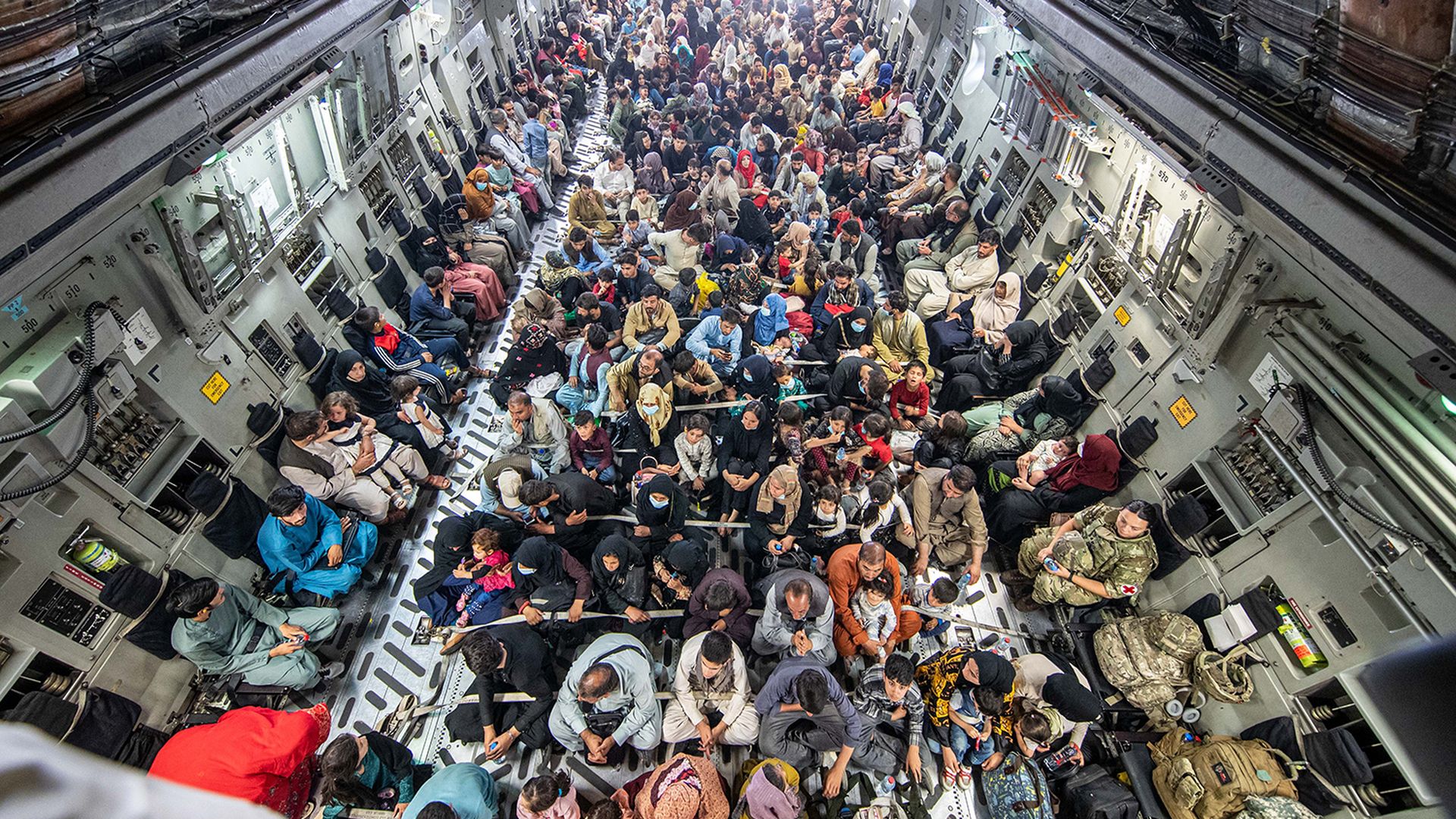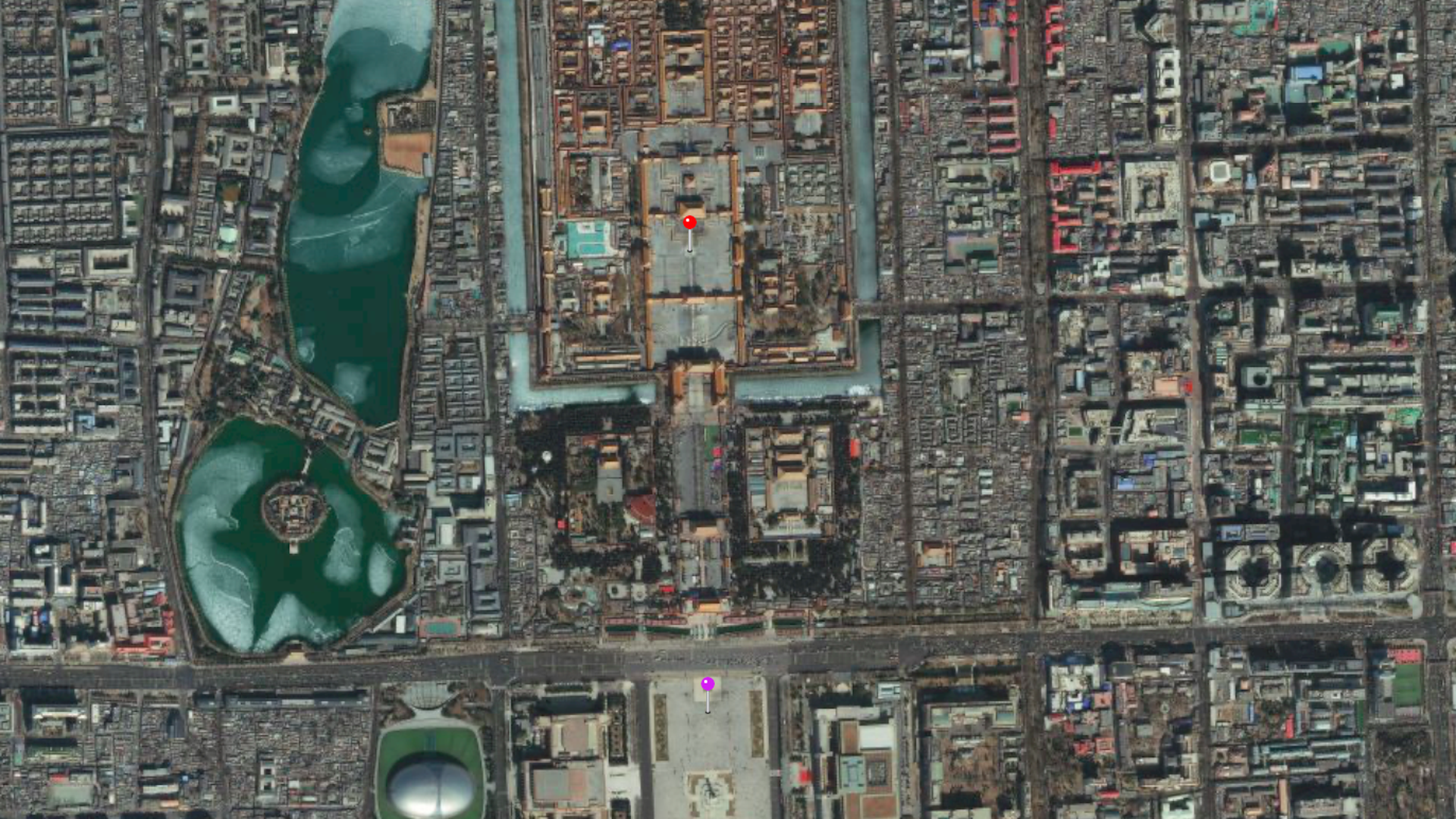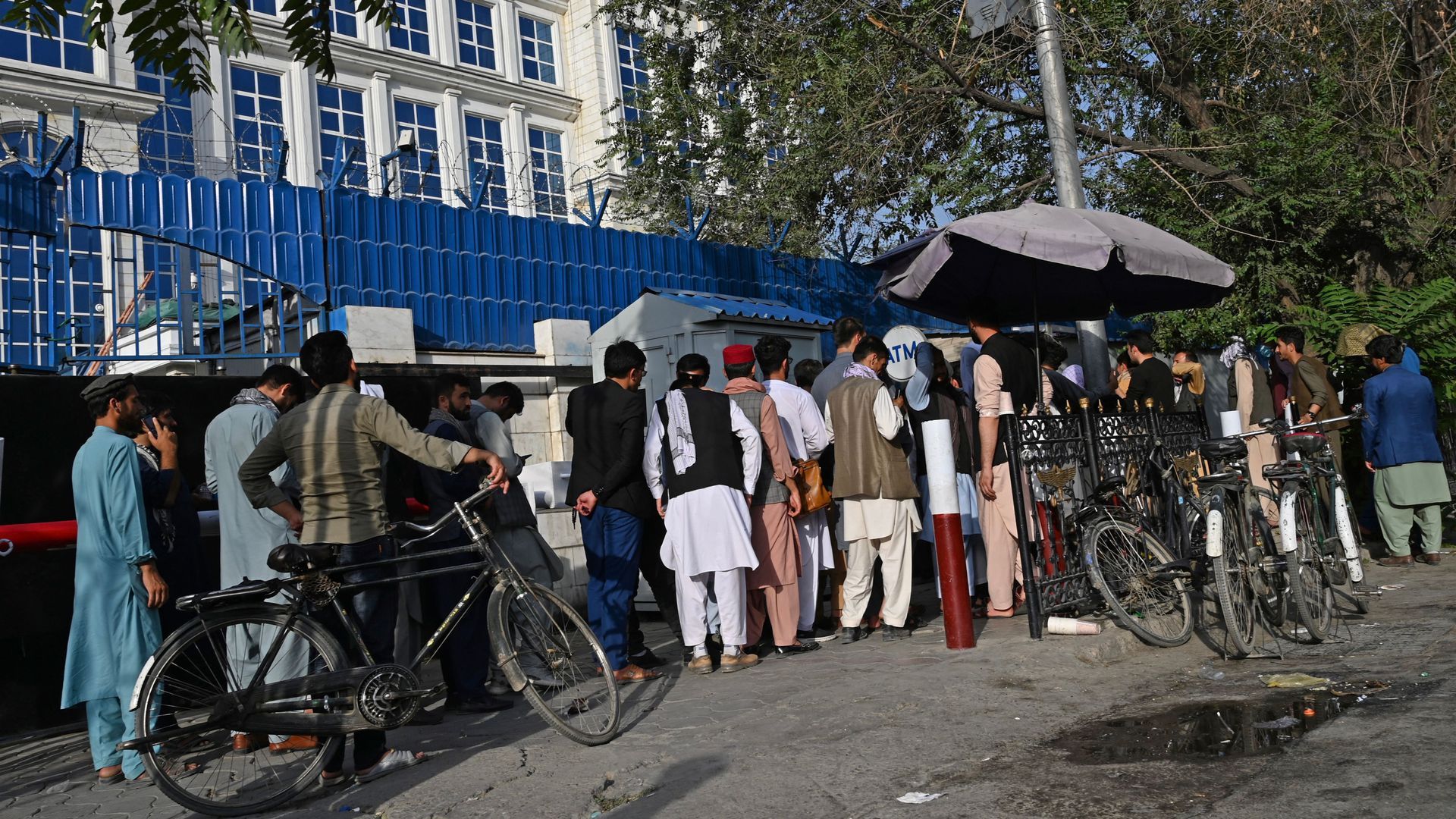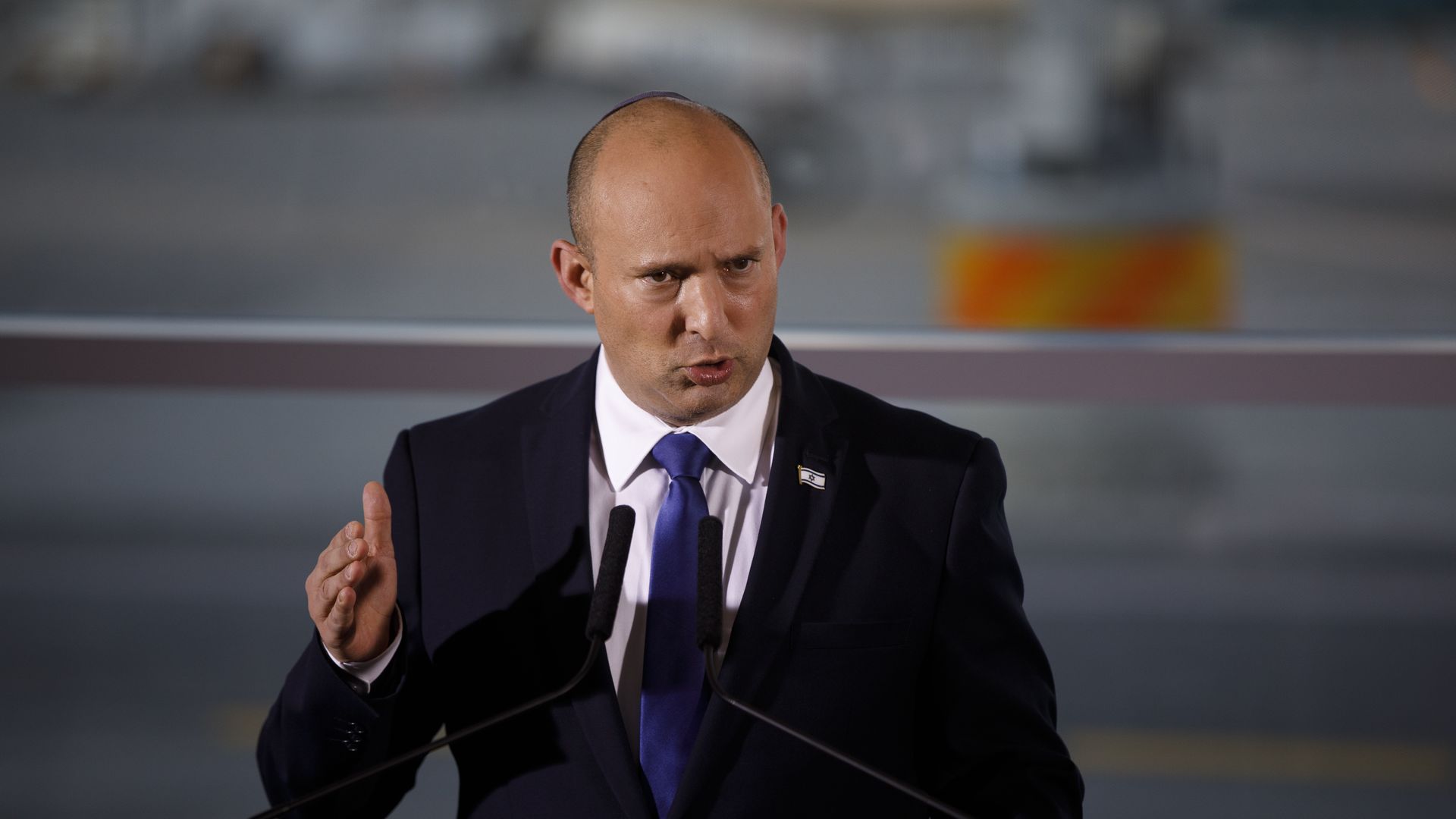| |
| |
| |
| Presented By Comedy Central |
| |
| Axios World |
| By Dave Lawler ·Aug 23, 2021 |
| Welcome back to Axios World. Hope you had a nice weekend. - We've got another Afghanistan-focused edition today (1,661 words, 6 minutes) as the news just keeps moving so quickly. I'll change things up a bit on Thursday, barring major developments in Kabul.
New arrival? Subscribe. |
| |
| |
| 1 big thing: Biden weighs allies' request to extend airlift deadline |
 |
|
| Waiting to board a U.S. Air Force plane in Kabul. Photo: Taylor Crul/U.S. Air Force via Getty |
| |
| President Biden is attempting to navigate between calls from allies to extend the Kabul airlift operation beyond Aug. 31 and warnings from the Taliban that doing so would cross a red line. Driving the news: U.K. Prime Minister Boris Johnson is expected to push for an extension beyond the end of August at a virtual G7 meeting tomorrow, which he will chair. - French Foreign Minister Jean-Yves Le Drian also said today that France was "concerned about the deadline set by the United States" as "additional time is needed to complete ongoing operations."
- But National Security Adviser Jake Sullivan said Biden still believes all Americans can be evacuated before Aug. 31. The goal remains to conclude the evacuations by then, though Biden will consult with allies, Sullivan added.
- It will likely be impossible to evacuate all Afghans who worked with NATO troops by Aug. 31, and dozens of other countries are still working to track down and extricate their citizens.
The big picture: As they conduct those operations amid scenes of chaos that the Biden administration arguably precipitated, and failed to anticipate, NATO allies are grappling with their own reliance on American power. What they're saying: "You look at the scenes at the Kabul airport, and what I see is the United States securing an airfield at the risk of several thousand U.S. troops to facilitate not just the evacuation of Americans but … third-country nationals from friends and foes alike," Sullivan said today from the White House podium. - Some critics of the chaotic withdrawal within NATO see instead a bungled retreat by a humbled superpower. But they likely agree with Sullivan's next point: "There is no other country in the world that could pull this off, bar none."
- One such critic, U.K. Defense Secretary Ben Wallace, has acknowledged that hopes of keeping the evacuation window open for a few additional days rest on the participation of American troops.
- "When they withdraw, that will take away the framework," Wallace said, "and we will have to go as well."
Coordination with the Taliban is vital to the U.S. airlift operation. The militants have pledged to give Americans safe passage to the airport and to also let eligible Afghans through, though some are still reportedly being turned back. - Pentagon spokesman John Kirby said today that continuous efforts at "deconfliction" with the Taliban had helped the U.S. pick up the pace of its evacuations.
- Kirby also acknowledged that it would take time to evacuate the 5,800 U.S. troops at the airport, meaning civilian evacuations could be suspended prior to a deadline that is already just a week away.
The other side: Taliban spokesman Suhail Shaheen said that it will "provoke reaction" and "consequences" if Biden reneges on his deadline. - The Taliban have not said what those consequences would be, but the militants control access to the airport perimeter.
- It's unclear whether they would risk conflict with the U.S. while on the precipice of total victory, or whether Biden would potentially jeopardize the security of the withdrawal operation by extending it beyond the deadline.
What to watch: The Taliban has said it intends to keep the airport open beyond Aug. 31 and allow Afghans who want to leave the country to do so. - But allies including Germany have expressed concerns about the feasibility of continuing evacuations after control of the airport passes from the U.S. to the Taliban.
|
    |
| |
| |
| 2. The state of the airlift |
 |
|
| A British evacuation flight. Photo: Ben Shread/MoD Crown Copyright via Getty |
| |
| U.S. officials seemed to speak with a newfound confidence about the evacuation efforts after announcing this morning that the U.S. had evacuated 10,400 people in the previous 24 hours, and 37,000 since the airlift began on Aug. 14. Breaking it down: The vast majority of those are Afghan nationals. The White House and Pentagon both said "several thousand" Americans had been evacuated without offering more precise numbers. The evacuees are being housed temporarily on U.S. bases in Qatar, the UAE, Kuwait, Italy, Germany and Spain — as well as New Jersey, Texas, Virginia and Wisconsin. The evacuation operation has in some cases been extended beyond the airport, Sullivan said: "We have developed a method to safely and efficiently transfer groups of Americans onto the airfield." - The Qatari ambassador has been transporting small groups of stranded Americans to the Kabul airport, per the Washington Post.
- Kirby also said the military was "going out as needed" to pick up Americans, but provided no details beyond the fact that one operation involved a helicopter while others did not.
|
    |
| |
| |
| 3. Data du jour: Afghan visas slowed before U.S. withdrawal |
 Data: The Refugee Processing Center; Chart: Thomas Oide/Axios The number of Afghan allies being brought to the United States on Special Immigrant Visas (SIV) had lagged until the collapse of Afghanistan forced the issue for the Biden administration, Axios' Stef Kight writes. - Biden administration officials say the Trump administration left them with a large backlog of unprocessed applications and no plan to expedite them.
- But Biden was also under pressure for moving too slowly on this issue before Kabul fell.
|
    |
| |
| |
| A message from Comedy Central |
| Consider considering "The Daily Show with Trevor Noah" |
| |
 |
| |
| For your consideration, Emmy-nominated "The Daily Show with Trevor Noah" covers all the big stories. Whether he's at home or anywhere else, Trevor delivers uncomfy truths, all while wearing comfy clothes. "The Daily Show with Trevor Noah" returns September 13 at 11 pm ET/10 pm CT. |
| |
| |
| Bonus: Where in the World |
 |
|
| Screengrab via Apple Maps |
| |
| Today we're visiting a major global city, a city within that city (red pin) and a historically significant square (purple pin). Scroll to the bottom for the answer. |
    |
| |
| |
| 4. Emerging economic crisis in Afghanistan |
 |
|
| Afghan people wait to collect money from an ATM in Kabul on Friday. Photo: AFP via Getty Images |
| |
| A developing economic crisis in Afghanistan is adding a fresh layer of turmoil in the country, Axios' Courtenay Brown writes. Why it matters: "[T]he value of the Afghan currency could collapse, inflation could accelerate and the mix of violence and chaos could be prolonged," the AP writes. What's new: Wire-transfer services Western Union and MoneyGram stopped facilitating payments into Afghanistan, a flow of money that's "a key source of support for many Afghan families," the Wall Street Journal reports. - ATMs are running out of cash. Prices for a range of essentials like flour and oil are rising sharply.
The big picture: The country's economy has relied on foreign aid that's at risk of shriveling up with the Taliban takeover. What to watch: The Taliban appointed Mohammad Idris — "an obscure official" — as acting head of Afghanistan's central bank, charged with steering monetary policy, Bloomberg reports. - The afghani, the country's currency, is in free fall. For a place that facilitates trade in U.S. dollars, any imports will get more expensive.
- What they're saying: "If the Taliban don't get cash infusions soon to defend the afghani, I think there's a real risk of a currency devaluation that makes it hard to buy bread on the streets of Kabul for ordinary people," the Overseas Development Institute's Graeme Smith tells the AP.
The bottom line: "Afghanistan, unfortunately, was already facing multiple crises. … What you have on top of that is going to be economic hardships," Ajmal Ahmady, who served as Afghanistan's central bank chief until the government fell and he fled the country, told CNN. |
    |
| |
| |
| 5. New prime minister takes office in Malaysia |
 |
|
| A thumbs up from the new PM. Photo: Mohd Firdaus/NurPhoto via Getty |
| |
| Ismail Sabri Yaakob began work today as Malaysia's new prime minister, bringing the once-dominant but corruption-plagued United Malays National Organization (UMNO) back to power. Why it matters: The new government will have to contend with the country's worst-yet outbreak of COVID-19 and try to usher in a semblance of political stability. - Ismail's Sabri's predecessor, Muhyiddin Yassin, lasted just 17 months and spent much of that time trying to avoid a vote of no confidence. He took power in a backroom deal, suspended parliament through a pandemic state of emergency, and at last resigned last week after losing his always-flimsy majority.
- The new prime minister is thought to have better relations with the various political factions.
Malaysia's king, who has become a major political player despite the role being largely ceremonial — it rotates among nine sultans — opted against early elections due to COVID-19 and instead appointed Ismail Sabri, who he said had secured a narrow majority. The king has said the new prime minister should soon face a confidence vote. - The news is a blow to opposition leader Anwar Ibrahim. He had previously been set to rotate into the prime ministership as part of a power-sharing deal following a historic opposition victory in the 2018 elections, but that coalition fractured.
- UMNO had dominated Malaysian politics for six decades before the massive 1MDB corruption scandal. Now they're back in power, but as part of a broader coalition.
|
    |
| |
| |
| 6. Coming attractions: Bennett visits Biden |
 |
|
| Bennett. Photo: Kobi Wolf/Bloomberg via Getty |
| |
| Israeli Prime Minister Naftali Bennett will try to turn Biden's attention to Iran when he visits Washington this week, Axios' Barak Ravid reports. Why it matters: With nuclear talks stalled and the White House consumed by the crisis in Afghanistan, Israeli officials worry that Iran will continue to develop its nuclear program without any pressure from the U.S. or its European allies. - Bennett will meet on Wednesday with Secretary of State Tony Blinken, Secretary of Defense Lloyd Austin and Sullivan.
- On Thursday morning he'll visit Biden at the White House.
Behind the scenes: Bennett's government completed an Iran policy review before the trip, and he'll present a new Israeli strategy to Biden, an Israeli official says. |
    |
| |
| |
| 7. Stories we're watching |
 |
|
| Disinfecting a school ahead of the new school year in Bozhou, China. Photo: STR/AFP via Getty |
| |
- Kamala Harris visits Singapore
- Latin American countries begin offering boosters
- New Zealand PM extends lockdown, says elimination goal "absolutely" right
- China reports no new infections
- Haiti struggles to distribute aid as death toll tops 2,200
- Food running out in Tigray
- More Russia sanctions over Navalny
Quoted: "I think it's irresponsible to say Americans are stranded. They are not." — White House Press Secretary Jen Psaki, responding sharply to a reporter's question today. She said the U.S. was committed to bringing all Americans home, so thus they aren't stranded. |
    |
| |
| |
| A message from Comedy Central |
| Consider considering "The Daily Show with Trevor Noah" |
| |
 |
| |
| For your consideration, Emmy-nominated "The Daily Show with Trevor Noah" covers all the big stories. Whether he's at home or anywhere else, Trevor delivers uncomfy truths, all while wearing comfy clothes. "The Daily Show with Trevor Noah" returns September 13 at 11 pm ET/10 pm CT. |
| |
| Answer: We're in Beijing visiting the Forbidden City and Tiananmen Square. |
 | | It'll help you deliver employee communications more effectively. | | |












No comments:
Post a Comment